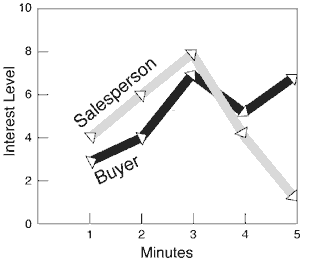Chapter 4:
The Practice of Focus
The most important thing about the practice of focus is that it cannot be forced. Trying hard to concentrate doesn’t work. It produces frustration, tiredness, and narrowness of vision. Focus follows interest, and interest does not need coercion. A gentle hand on the steering wheel of attention will suffice.
A second thing to keep in mind about the practice of focus is to be nonjudgmental. When you practice staying focused you are apt to become more aware of your distractions. If you get angry with yourself for losing focus, you will compound your distraction from the task at hand. The alternative approach is that of the learner. As a learner, I want to maintain my focus, but I am also interested in identifying what distracts me.
* * *
Focused Communication – One of the most valuable areas at work to practice focus is in communicating with another person. Effective work involves good communication, and focus of attention is the critical element to effective communication. Again, start with nonjudgmental observation.
Have you ever noticed the extent to which there is a conversation going on in your head while you are talking with another person? I find that internal comments and feelings often distract me from fully listening to the other person. I find myself thinking I already know what the person is going to say, so I don’t really have to listen. I think about whether I agree or disagree with what is being said and I rehearse my next response. How much of my attention does this internal conversation absorb?
The task of listening to another person is not that different from that of focusing on a tennis ball. The other person’s voice is coming toward you and you are going to have to respond. What are you thinking and feeling while the communication is coming your way? Do you feel like the tennis player who is threatened by a hard shot toward his backhand? “Here comes a judgment or rejection right toward my weakness”? Or, “Here comes a statement I don’t agree with.” Just as with the defensive tennis player, such a listener is subject to the cycle of self-interference. Shallow breathing, flushed face, tightened body posture, and other physiological reactions disrupt the harmony of the inner environment. The listener is apt to be thrown into a defensive posture that makes it just as hard for him to respond appropriately as it is for the tennis player to return a difficult shot.
* * *
An Exercise: Focus on Interest Level – In an exercise designed for AT&T account executives, two volunteers were asked to role-play in the buying and selling of a used car. They were given five minutes to conduct the sales conversation. The salesperson was instructed to simply focus attention on the changes in interest level of the buyer over the course of the five minutes. He was told not to try to do anything to influence the interest level, but just to observe it. Similarly, the buyer himself and the students watching the exercise were asked to observe the buyer’s interest level and record their observations at the end of each minute on a simple graph.
At the end of the exercise, the salesperson and the buyer were asked to graph their observations. The buyer’s graph looked like this: 3 4 7 5 7.

Interest chart
The salesperson’s graph was 4 6 8 4 1.
The salesperson was asked what he observed. “The interest level was building pretty steadily until the end. Then I gave up and totally lost him.”
The buyer was asked the same question. “Well, I was interested until I felt an objection during the fourth minute. Something changed about the salesperson. He seemed to get much more relaxed and comfortable, and I was ready to buy right away.”
This was a shock and a big learning experience for the salesperson. At the moment he gave up, the customer had become ready to buy! And he hadn’t seen it.
